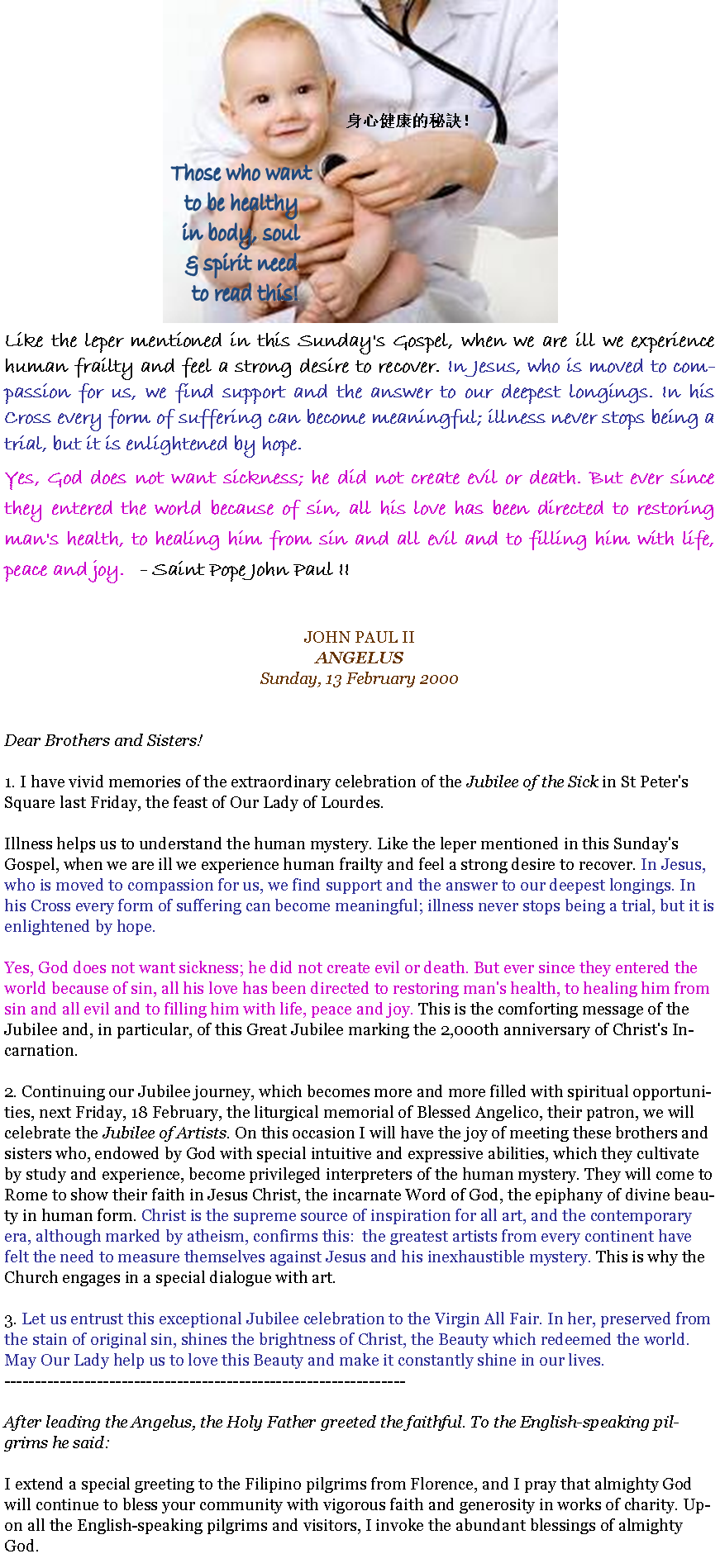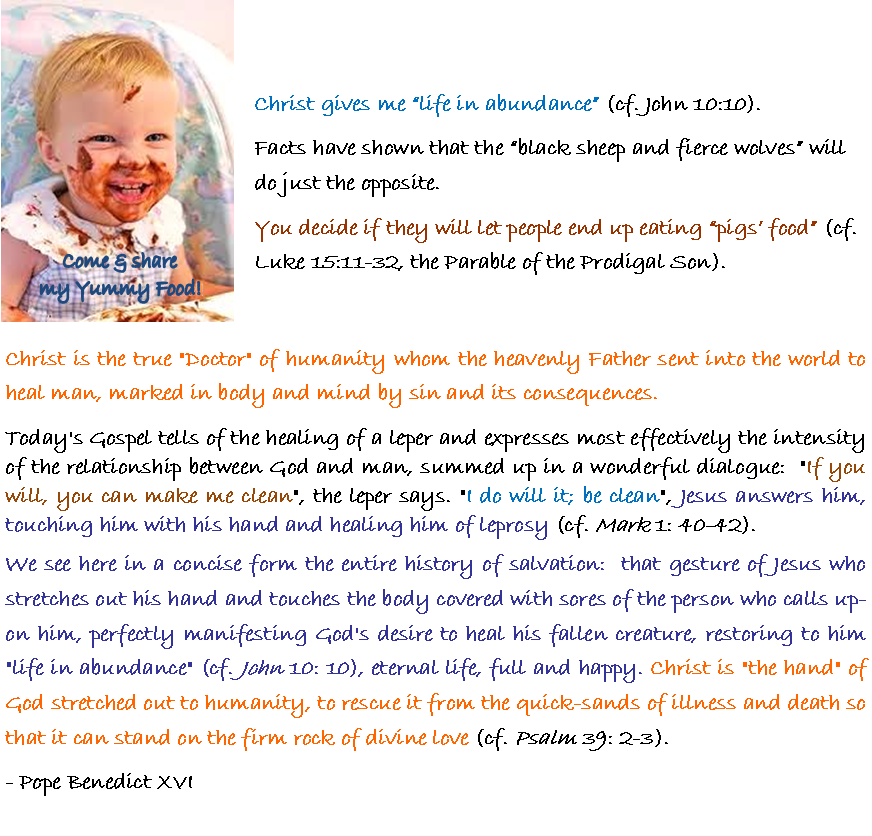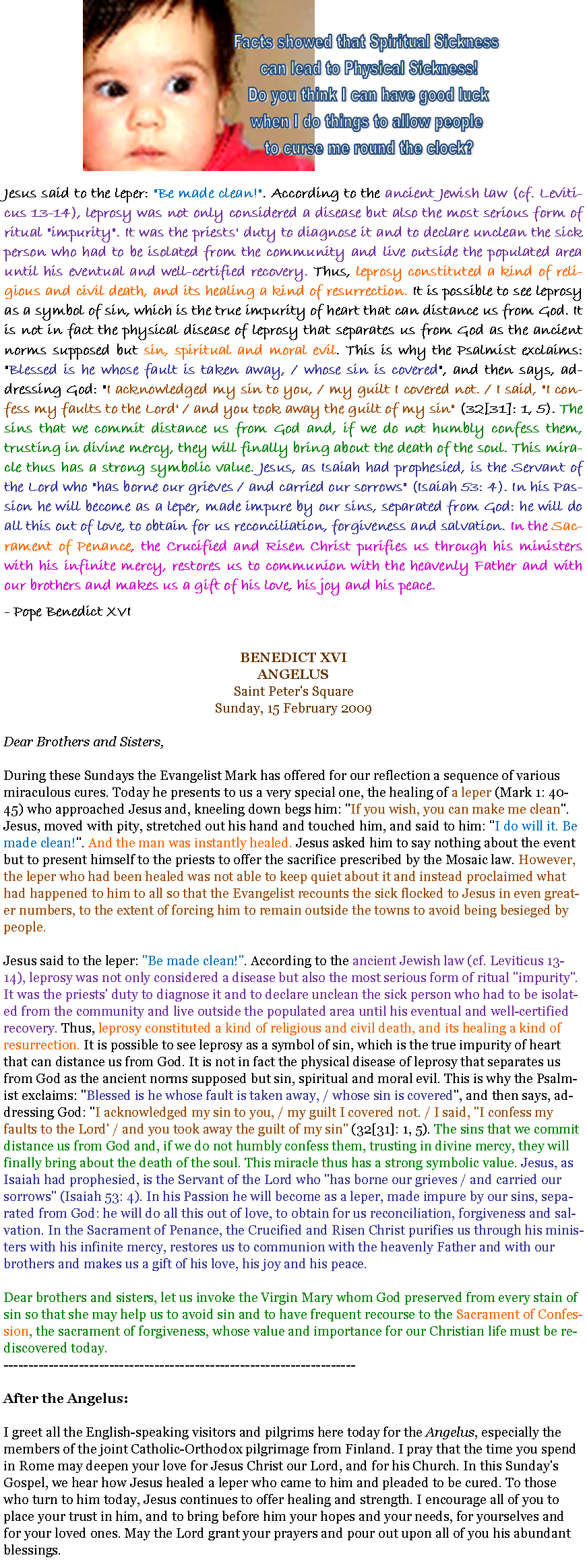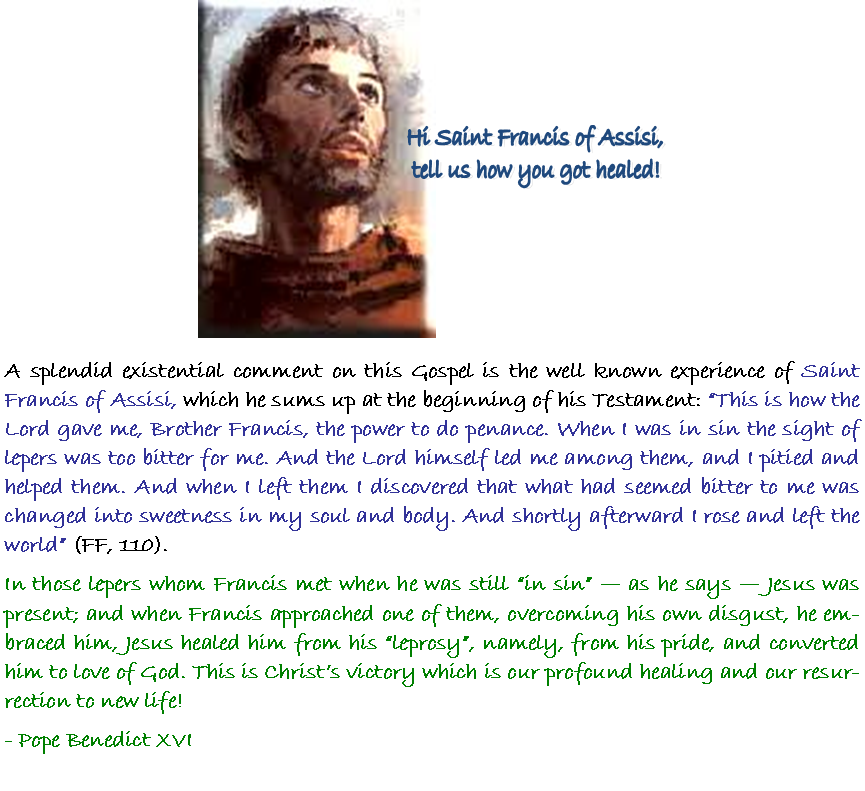|
150 |

|
1 Corinthians 13 > Encouragements-78. Sixth Sunday in Ordinary Time, Gospel Reading: Extracted from the holy Gospel according to Saint Mark 1:40-45 A leper came to Jesus and pleaded on his knees: ‘If you want to’ he said ‘you can cure me.’ Feeling sorry for him, Jesus stretched out his hand and touched him. ‘Of course I want to!’ he said. ‘Be cured!’ And the leprosy left him at once and he was cured. Jesus immediately sent him away and sternly ordered him, ‘Mind you say nothing to anyone, but go and show yourself to the priest, and make the offering for your healing prescribed by Moses as evidence of your recovery.’ The man went away, but then started talking about it freely and telling the story everywhere, so that Jesus could no longer go openly into any town, but had to stay outside in places where nobody lived. Even so, people from all around would come to him.
Sharing: It was the 6th Sunday in Ordinary Time on 15 February 2015.
The Readings that were read in the Eucharistic Celebrations all over the world on the same day are shown in the previous page & above:
1st Reading: Leviticus 13:1-2, 44-46, Responsorial: Psalm 32:1-2, 5, 11, 2nd Reading: 1 Corinthians 10:31-11:1 & Gospel Reading: Mark 1:40-45.
We have extracted the Homilies Saint Pope John Paul II, Pope Benedict XVI & Pope Francis I based on the aforesaid Readings to share with you, so that you could similarly be encouraged: |


|
The heritage of Saints Cyril and Methodius is valuable from the cultural point of view. In fact, their work contributed to consolidating the common Christian roots of Europe, roots that with their rich sap enriched European history and institutions. For this very reason, it has been asked that in the future Constitutional Treaty of the European Union there be room for the common patrimony of the East and of the West. Such a reference would take nothing away from the appropriate secular character of the political structures (cf. Lumen gentium, n. 36; Gaudium et spes, nn. 36, 76), but, on the contrary, would help to preserve the continent from the double risk of ideological secularism and sectarian fundamentalism. United by their values and their histories, European peoples can fully carry out their role in the promotion of justice and peace in the whole world. To this end, let us pray to the Blessed Virgin Mary and the holy Patrons of Europe. - Saint Pope John Paul II |
|
JOHN PAUL II ANGELUS Sunday, 16 February 2003
Dear Brothers and Sisters,
1. Last Friday, 14 February, we celebrated the feast of Saints Cyril and Methodius, apostles of the Slavs and co-patrons of Europe. Born at Salonika in the first half of the ninth century, and formed in the Byzantine culture, the two brothers courageously took up the mission of evangelizing the Slav peoples of Greater Moravia at the heart of Europe.
A central feature of their apostolate was their maintaining fidelity to the Roman Pontiff and to the Patriarch of Constantinople, while respecting the traditions and language of the Slav peoples. They were inspired by a profound sense of the one, holy, catholic and apostolic Church while the prayer of Jesus "that they may be one" (John 17:11) was their missionary slogan. May their example and intercession help the Christians of the East and of the West to re-establish their full unity (cf. Encyclical Epistle Slavorum Apostoli, n. 13: AAS 77[1985], 794-795).
2. The heritage of Saints Cyril and Methodius is valuable from the cultural point of view. In fact, their work contributed to consolidating the common Christian roots of Europe, roots that with their rich sap enriched European history and institutions.
For this very reason, it has been asked that in the future Constitutional Treaty of the European Union there be room for the common patrimony of the East and of the West. Such a reference would take nothing away from the appropriate secular character of the political structures (cf. Lumen gentium, n. 36; Gaudium et spes, nn. 36, 76), but, on the contrary, would help to preserve the continent from the double risk of ideological secularism and sectarian fundamentalism.
3. United by their values and their histories, European peoples can fully carry out their role in the promotion of justice and peace in the whole world. To this end, let us pray to the Blessed Virgin Mary and the holy Patrons of Europe. ----------------------------------------------------------------
After the Angelus
I am pleased to greet the Schola Cantorum of St Philip's Preparatory School in London. May your music and your lives always be directed to the praise of God and the growth of his Kingdom. Upon all the English-speaking pilgrims and visitors, I invoke the grace and peace of Our Lord Jesus Christ. |

|
Parable of the Prodigal Son (Luke 15:11-32) > Encouragements-209.
BENEDICT XVI ANGELUS Saint Peter's Square
Dear Brothers and Sisters,
Yesterday, 11 February, the liturgical Memorial of Our Lady of Lourdes, we celebrated World Day of the Sick. This year its most important events took place in Adelaide, Australia, and included an international Congress on the ever pressing topic of mental health.
Illness is a typical feature of the human condition, to the point that it can become a realistic metaphor of it, as St Augustine expresses clearly in his prayer: "Have mercy on me, Lord! See: I do not hide my wounds from you. You are the doctor, I am the sick person; you are merciful, I am wretched" (Conf. X, 39).
Today's Gospel tells of the healing of a leper and expresses most effectively the intensity of the relationship between God and man, summed up in a wonderful dialogue: "If you will, you can make me clean", the leper says. "I do will it; be clean", Jesus answers him, touching him with his hand and healing him of leprosy (cf. Mark 1: 40-42).
We see here in a concise form the entire history of salvation: that gesture of Jesus who stretches out his hand and touches the body covered with sores of the person who calls upon him, perfectly manifesting God's desire to heal his fallen creature, restoring to him "life in abundance" (cf. John 10: 10), eternal life, full and happy. Christ is "the hand" of God stretched out to humanity, to rescue it from the quick-sands of illness and death so that it can stand on the firm rock of divine love (cf. Psalm 39: 2-3).
May the Blessed Virgin help each one find comfort in body and spirit through satisfactory health-care assistance and fraternal charity, expressed by means of practical and supportive attention.
Two days ago the 20th Winter Olympics opened in Turin. I address my cordial greeting to the organizers, to those in charge of the International Olympic Committee and to all the athletes who have come from every part of the world. I hope that this beautiful sports competition will take place under the banner of the Olympic values of loyalty, joy and brotherhood, thus making a contribution to peace among peoples.
Today, 12 February, is the 75th anniversary of the inauguration of Vatican Radio and Pope Pius XI's first Radio Message to the world. He had commissioned the scientist Guglielmo Marconi to build the Vatican Radio station. Thanks to the radio, and later, television, the Gospel message and the Popes' words have been able to reach all people more quickly and easily.
I am happy to greet all the English-speaking visitors present at today's Angelus. Yesterday, the Church celebrated the 14th Annual World Day of the Sick in Adelaide, Australia. Let us continue to pray for all those who are ill, asking the Lord Jesus to give them strength, courage and grace. Upon all of you I invoke God's abundant Blessings and wish you a good Sunday! |


|
BENEDICT XVI ANGELUS St. Peter's Square [Video] Dear Brothers and Sisters,
Last Sunday we saw that in his public life Jesus healed many sick people, revealing that God wants life for human beings, life in its fullness. This Sunday’s Gospel (Mark 1:40-45) shows us Jesus in touch with a form of disease then considered the most serious, so serious as to make the person infected with it “unclean” and to exclude that person from social relations: we are speaking of leprosy. Special legislation (cf. Leviticus 13-14) allocated to priests the task of declaring a person to be “leprous”, that is, unclean; and it was likewise the priest’s task to note the person’s recovery and to readmit him or her, when restored to health, to normal life.
While Jesus was going about the villages of Galilee preaching, a leper came up and besought him: “If you will, you can make me clean”. Jesus did not shun contact with that man; on the contrary, impelled by deep participation in his condition, he stretched out his hand and touched the man — overcoming the legal prohibition — and said to him: “I will; be clean”.
That gesture and those words of Christ contain the whole history of salvation, they embody God’s will to heal us, to purify us from the illness that disfigures us and ruins our relationships. In that contact between Jesus’ hand and the leper, every barrier between God and human impurity, between the Sacred and its opposite, was pulled down. This was not of course in order to deny evil and its negative power, but to demonstrate that God’s love is stronger than all illness, even in its most contagious and horrible form. Jesus took upon himself our infirmities, he made himself “a leper” so that we might be cleansed.
A splendid existential comment on this Gospel is the well known experience of Saint Francis of Assisi, which he sums up at the beginning of his Testament: “This is how the Lord gave me, Brother Francis, the power to do penance. When I was in sin the sight of lepers was too bitter for me. And the Lord himself led me among them, and I pitied and helped them. And when I left them I discovered that what had seemed bitter to me was changed into sweetness in my soul and body. And shortly afterward I rose and left the world” (FF, 110).
In those lepers whom Francis met when he was still “in sin” — as he says — Jesus was present; and when Francis approached one of them, overcoming his own disgust, he embraced him, Jesus healed him from his “leprosy”, namely, from his pride, and converted him to love of God. This is Christ’s victory which is our profound healing and our resurrection to new life!
Dear friends, let us turn in prayer to the Virgin Mary, whom we celebrated yesterday commemorating her Apparitions in Lourdes. Our Lady gave St Bernadette an ever timely message: the invitation to prayer and penance. Through his Mother it is always Jesus who comes to meet us to set us free from every sickness of body and of soul. Let us allow ourselves to be touched and cleansed by him and to treat our brethren with compassion! -----------------------------------------------------------------------------
APPEAL
Dear Brothers and Sisters,
I am following with deep apprehension the dramatic and escalating episodes of violence in Syria. In the past few days they have taken a heavy toll of victims. I remember in prayer the victims among whom are several children, the injured and all those who are suffering the consequences of an ever more worrying conflict. In addition, I renew a pressing appeal to put an end to violence and bloodshed. Lastly, I invite everyone — and first of all the political Authorities in Syria — to give priority to the way of dialogue, of reconciliation and of the commitment to peace. It is urgently necessary to respond to the legitimate aspirations of the different members of the nation, as well as to the hopes of the international community, concerned for the common good of the society as a whole and for the region. *** After the Angelus:
I am pleased to welcome all of you to St Peter’s Square on this cold morning, especially the students and staff of Sion-Manning School from London. At Mass today, the Gospel tells us of how our Lord willingly cured a leper. May we not be afraid to go to Jesus, beg him to heal our sinfulness, and bring us safely to eternal life. God bless you and your loved ones!
I wish you all a good Sunday and a good week! Next Sunday without snow! Very many good wishes and have a good Sunday. |

|
Luke 15:11-32 > Encouragements-209. Matthew 20:1-16 > Encouragements-35.
HOLY MASS WITH THE NEW CARDINALS HOMILY OF HIS HOLINESS POPE FRANCIS Vatican Basilica
“Lord, if you choose, you can make me clean”… Jesus, moved with compassion, stretched out his hand and touched him, and said: “I do choose. Be made clean!” (Mark 1:40-41). The compassion of Jesus! That com-passion which made him draw near to every person in pain! Jesus does not hold back; instead, he gets involved in people’s pain and their need… for the simple reason that he knows and wants to show com-passion, because he has a heart unashamed to have “compassion”.
“Jesus could no longer go into a town openly, but stayed in the country; and people came to him from every quarter” (Mark 1:45). This means that Jesus not only healed the leper but also took upon himself the marginalization enjoined by the law of Moses (cf. Leviticus 13:1-2, 45-46). Jesus is unafraid to risk sharing in the suffering of others; he pays the price of it in full (cf. Isaiah 53:4).
Compassion leads Jesus to concrete action: he reinstates the marginalized! These are the three key concepts that the Church proposes in today’s liturgy of the word: the compassion of Jesus in the face of marginalization and his desire to reinstate.
Marginalization: Moses, in his legislation regarding lepers, says that they are to be kept alone and apart from the community for the duration of their illness. He declares them: “unclean!” (cf. Leviticus 13:1-2, 45-46).
Imagine how much suffering and shame lepers must have felt: physically, socially, psychologically and spiritually! They are not only victims of disease, but they feel guilty about it, punished for their sins! Theirs is a living death; they are like someone whose father has spit in his face (cf. Numbers 12:14).
In addition, lepers inspire fear, contempt and loathing, and so they are abandoned by their families, shunned by other persons, cast out by society. Indeed, society rejects them and forces them to live apart from the healthy. It excludes them. So much so that if a healthy person approached a leper, he would be punished severely, and often be treated as a leper himself.
True, the purpose of this rule was “to safeguard the healthy”, “to protect the righteous”, and, in order to guard them from any risk, to eliminate “the peril” by treating the diseased person harshly. As the high priest Caiaphas exclaimed: “It is better to have one man die for the people than to have the whole nation destroyed” (John 11:50).
Reinstatement: Jesus revolutionizes and upsets that fearful, narrow and prejudiced mentality. He does not abolish the law of Moses, but rather brings it to fulfillment (cf. Matthew 5:17). He does so by stating, for example, that the law of retaliation is counterproductive, that God is not pleased by a Sabbath observance which demeans or condemns a man. He does so by refusing to condemn the sinful woman, but saves her from the blind zeal of those prepared to stone her ruthlessly in the belief that they were applying the law of Moses. Jesus also revolutionizes consciences in the Sermon on the Mount (cf. Matthew 5), opening new horizons for humanity and fully revealing God’s “logic”. The logic of love, based not on fear but on freedom and charity, on healthy zeal and the saving will of God. For “God our Saviour desires everyone to be saved and to come to the knowledge of the truth” (1 Timothy 2:3-4). “I desire mercy and not sacrifice” (Matthew 12:7; Hosea 6:6).
(Sermon on the Mount: Matthew 5).
Jesus, the new Moses, wanted to heal the leper. He wanted to touch him and restore him to the community without being “hemmed in” by prejudice, conformity to the prevailing mind-set or worry about becoming infected. Jesus responds immediately to the leper’s plea, without waiting to study the situation and all its possible consequences! For Jesus, what matters above all is reaching out to save those far off, healing the wounds of the sick, restoring everyone to God’s family! And this is scandalous to some people!
Jesus is not afraid of this kind of scandal! He does not think of the closed-minded who are scandalized even by a work of healing, scandalized before any kind of openness, by any action outside of their mental and spiritual boxes, by any caress or sign of tenderness which does not fit into their usual thinking and their ritual purity. He wanted to reinstate the outcast, to save those outside the camp (cf. John 10).
There are two ways of thinking and of having faith: we can fear to lose the saved and we can want to save the lost. Even today it can happen that we stand at the crossroads of these two ways of thinking. The thinking of the doctors of the law, which would remove the danger by casting out the diseased person, and the thinking of God, who in his mercy embraces and accepts by reinstating him and turning evil into good, condemnation into salvation and exclusion into proclamation.
These two ways of thinking are present throughout the Church’s history: casting off and reinstating. Saint Paul, following the Lord’s command to bring the Gospel message to the ends of the earth (cf. Matthew 28:19), caused scandal and met powerful resistance and great hostility, especially from those who demanded unconditional obedience to the Mosaic law, even on the part of converted pagans. Saint Peter, too, was bitterly criticized by the community when he entered the house of the pagan centurion Cornelius (cf. Acts 10).
Continue next page …
21 March 2015, 3:00pm SGT |